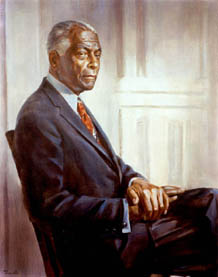About Dr. Benjamin E. Mays
Latest News
About Dr. Benjamin E. Mays

Benjamin Elijah Mays was born in 1895 in South Carolina, to parents who had been born in slavery and freed at the end of the Civil War. Mays excelled as a student from an early age, and he was driven throughout his youth by a desire for education. Beginning in a one-room rural schoolhouse, he absorbed all he could from a succession of local schools, graduating from high school and entering college at Virginia Union in Richmond, Virginia. Determined to continue his university education outside the segregated South, Mays entered Bates College in Maine in 1917. Despite being one of a very few black students at Bates, Mays encountered little racial prejudice there and felt that his teachers and peers treated him as an equal.
Mays had set his sights on the University of Chicago for graduate study, and he entered the Divinity School there in 1921. He earned his master's degree in 1925 and his doctorate in 1935. During these years, he was also ordained into the Baptist ministry. From 1934 to 1940, Mays served as dean of the Howard University School of Religion and then moved on to the presidency of Morehouse College, a position he held with distinction for the next quarter of a century.
Mays spoke early and often against segregation and for education. He was a model for one of his Morehouse students, Martin Luther King, Jr., and he served the young minister as an unofficial senior advisor. Mays gave the benediction at the close of the program at the 1963 March on Washington, as well as the eulogy at King's funeral in 1968. Among his many books were the first sociological study of African-American religion, The Negro's Church, published in 1933; The Negro's God, of 1938; Disturbed About Man, of 1969; and his autobiography Born to Rebel, of 1971. These books reveal a combination of sharp intellect, religious commitment, and prophetic conviction. Mays received nearly thirty honorary doctorates and other honors and awards. He died in 1984.